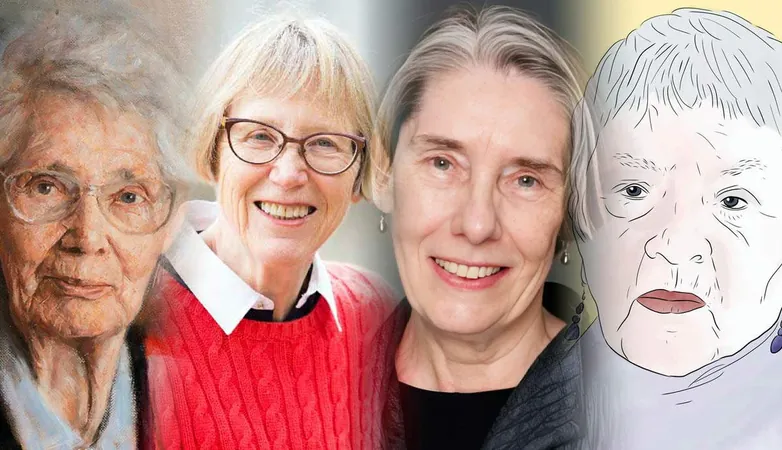
Meet the Trailblazing Women Who Revolutionized the Philosophy of Science
2024-12-26
Author: Siti
In a field historically dominated by men, women have often faced significant hurdles just to have their voices heard. The intersection of philosophy and science—a realm where rigorous thought meets empirical inquiry—has produced incredible work from female philosophers who battled against misogyny and systemic barriers. Their pioneering contributions not only reshaped academic discourse but also shattered long-standing societal norms. Let’s highlight five remarkable women who made significant strides in the philosophy of science.
Although philosophical engagement with science surged in the 20th century, the fundamental relationship between the two is rooted in earlier explorations. Notably, early scientists referred to themselves as "natural philosophers," indicating a convergence of empirical observation with philosophical inquiry. As formal philosophy of science emerged—especially through the analytic tradition in the 20th century—predominantly male figures like Karl Popper and Thomas Kuhn rose to prominence. Yet, overshadowed by these figures, a cadre of female thinkers also made enduring marks on the field.
1. Mary Hesse (1924-2016)
Mary Hesse was a standout philosopher of science who navigated a male-dominated academic landscape. With a BA in mathematics and a PhD in electron microscopy from Imperial College London, she followed a unique path that led her to the philosophy of science during the 1950s. Hesse worked at the University of Cambridge, where she became the youngest faculty member and the only woman among philosophers.
Her seminal work, *Forces and Fields*, demonstrated the intrinsic connection between theory and practice in physics, arguing the importance of historical context in scientific methodology. By urging philosophers to consider the actual workings of scientific practice, Hesse opened the door for a more nuanced understanding of how theories work—and how personal and social factors affect scientific inquiry.
2. Nancy Cartwright (b. 1944)
Nancy Cartwright has made significant contributions to our understanding of scientific laws, causation, and objectivity. With a multi-faceted academic background, Cartwright earned her degrees in mathematics and philosophy, and she currently teaches at both the University of California at San Diego and Durham University.
Her influential book, *How the Laws of Physics Lie*, reframed the discussion about scientific laws, asserting they are often idealized representations that do not directly correspond to reality. Through her work, she has encouraged a closer examination of scientific practices across diverse fields, including economics and environmental science, highlighting the complexity and messiness of real-world applications.
3. Heather Douglas
Heather Douglas has emerged as a powerful advocate for a socially responsible philosophy of science. An alumna of the University of Pittsburgh, she has held leadership positions at various institutions, including Michigan State University. Douglas challenges the traditional notion of a value-free science, positing that ethical and political values are inherent to scientific practice.
In her book, *Science, Policy, and the Value-Free Ideal*, she argues that recognizing these values is crucial for the integrity and accountability of science, especially regarding how scientific knowledge informs public policy—a key concern in today's climate crisis.
4. Sandra Harding (b. 1935)
A prominent figure in feminist epistemology, Sandra Harding has dedicated her career to exposing biases within the scientific method. With degrees from Rutgers University and New York University, she is currently a Distinguished Professor Emerita at UCLA. Harding's work emphasizes the importance of integrating multiple perspectives, particularly those of women and marginalized communities, into scientific discourse.
Her influential book, *The Science Question in Feminism*, critiques the historical male dominance in science and argues for a re-evaluation of what constitutes objective knowledge. Through her research, she has prompted a necessary reassessment of how science can reflect a more inclusive worldview.
5. Alison Wylie (b. 1954)
Alison Wylie is noted for her efforts to decolonize archaeology and her extensive research on evidential reasoning. Educated in both anthropology and philosophy, she holds a professorship at the University of British Columbia and is active in initiatives that integrate Indigenous histories into academic discourse.
Wylie’s award-winning work has examined how historical scientists validate their claims about the past, advocating for a more comprehensive understanding of the evidential processes at play. Her publications continue to influence the field by emphasizing the importance of context and diverse narratives in reconstructing historical knowledge.
These women not only challenged the status quo but also illuminated the necessity of diverse perspectives in understanding the complexities of science. Their legacies remind us that gender should never be a barrier to intellectual achievement and that progress is driven by inclusive dialogue in every field of inquiry. As we navigate an increasingly complex scientific landscape, understanding the contributions of these trailblazers becomes essential in fostering a more equitable future in both philosophy and science.





 Brasil (PT)
Brasil (PT)
 Canada (EN)
Canada (EN)
 Chile (ES)
Chile (ES)
 España (ES)
España (ES)
 France (FR)
France (FR)
 Hong Kong (EN)
Hong Kong (EN)
 Italia (IT)
Italia (IT)
 日本 (JA)
日本 (JA)
 Magyarország (HU)
Magyarország (HU)
 Norge (NO)
Norge (NO)
 Polska (PL)
Polska (PL)
 Schweiz (DE)
Schweiz (DE)
 Singapore (EN)
Singapore (EN)
 Sverige (SV)
Sverige (SV)
 Suomi (FI)
Suomi (FI)
 Türkiye (TR)
Türkiye (TR)